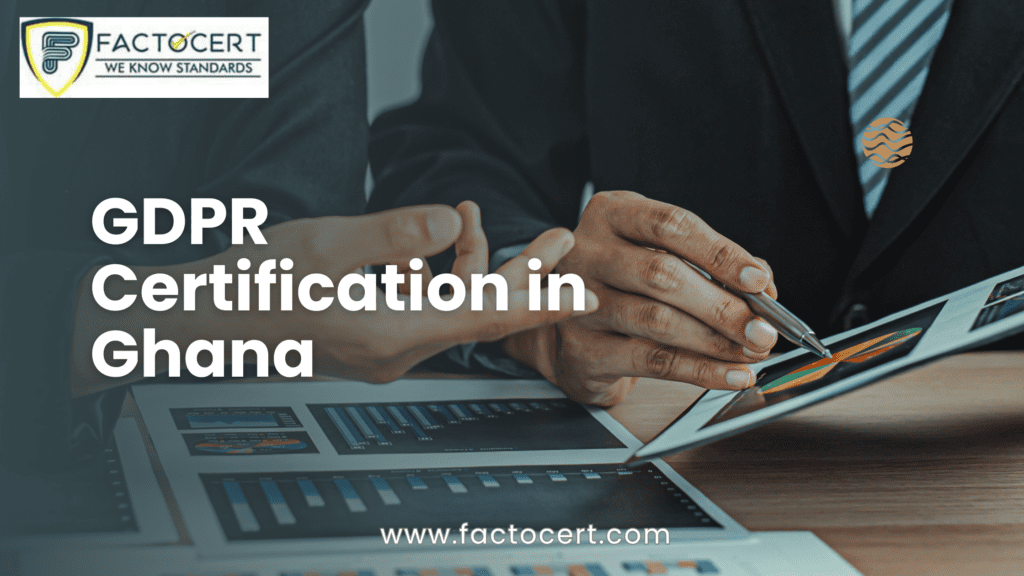GDPR Certification in Ghana for companies Since data is vital to business in this digital age, protecting people’s privacy and rights has become a worldwide issue. The European Union made the General Data Protection Regulation (GDPR) to protect the personal data of EU people. It is a big step in the right direction. Even though GDPR is a European law, it has effects worldwide, even in Ghana. This blog will talk about whether GDPR licensing is needed in Ghana and the steps businesses can take to follow the rules.
Understanding GDPR Certification and how it affects the whole world.
The GDPR Certification in Ghana is meant to give people power over their data and ensure that businesses are responsible. It affects businesses inside and outside the EU that handle the personal information of people who live in the EU. Because GDPR applies outside of Europe, Ghanaian companies that do business with European users or clients must follow its rules.
Do companies in Ghana need GDPR Certification?
As of right now, Ghanaian Companies do not require GDPR Certification. However, Ghanaian companies that deal with EU citizens’ data must strictly follow the GDPR rules. Not following the rules can lead to harsh punishments, such as hefty fines. Adhering to GDPR rules is necessary for businesses that deal with data across borders, even though Certification is not required.
Steps to Achieve GDPR Compliance in Ghana.
Understand and Map Data Flows:
First, thoroughly check all the sensitive information your business handles. Find out how this data moves through your company and which third-party providers are involved. The basis for building a strong GDPR compliance plan will be this mapping.
You should hire a Data Protection Officer (DPO):
Choose a Data Protection Officer who will be in charge of making sure that GDPR rules are followed. This person should know much about data security laws and ensure the company follows GDPR rules.
Change the privacy notices and policies:
Check your data policies and warnings to ensure they align with GDPR rules and make any necessary changes. Ensure you are transparent with your users or clients about gathering, processing, and storing personal data.
Data Protection Impact Assessments (DPIAs) should be used:
Do DPIAs figure out what the risks are that come with handling data and how to lower them? This proactive method helps find possible privacy problems and makes it possible to take steps to fix them.
Safe Processing of Data:
Protect the personal information you handle by putting in place robust security measures. Encryption, access limits, and frequent security checks are all part of this. Data protection is critical under GDPR, and a breach can have harmful effects.
Obtain Consent and Provide Opt-Out Options:
Before processing someone’s data, ensure you have their explicit permission. Also, it makes it easy for users to choose not to participate in data handling activities. GDPR stresses how important it is for permission to be freely given and based on knowledge.
Help people with data rights:
Learn about the rights of data subjects under GDPR, such as the right to see their data and have it corrected, deleted, or sent to another person. Set up ways to quickly react to requests from data subjects.
Get your team ready:
Teach your workers about GDPR rules and how important it is to protect data through training events. Staff must be aware of GDPR compliance steps for them to work well.
Watch and Update:
Keep an eye on how you’re handling data regularly and make changes to your GDPR compliance steps as needed. The regulatory environment changes over time; keeping up with those changes is essential for following the rules.
Seek Legal Guidance:
Hire lawyers who know a lot about data security laws to ensure your business’s rules and procedures align with GDPR standards. A lawyer can give you helpful advice and ideas throughout the legal process.
Why choose Factocert for GDPR Certification in Ghana?
Are you seeking GDPR Certification in Ghana? Factocert is a significant GDPR Certification Bodies in Ghana, providing GDPR Consultants in Ghana and with offices in Accra, Kumasi, Tema, Tamale, Cape Coast, and other important cities. We provide a variety of ISO Standards at discounted prices, including ISO 27001, ISO 9001, GDP, GLP,GMP, SA 8000 Halal, ISO 17025, ISO 14001, ISO 22000, and others. For further information, please visit www.factocert.com or contact us at contact@factocert.com
conclusion
GDPR Certification in Ghana is not required, but companies with European entities or other countries subject to GDPR must comply with the rules. Ghanaian companies cannot only escape legal trouble by knowing GDPR and taking the proper steps but also build trust with their partners and customers. The path to GDPR compliance is a promise to handle data responsibly, protect privacy, and honestly run a business in the digital age.
For More information visit : GDPR Certification in Ghana





